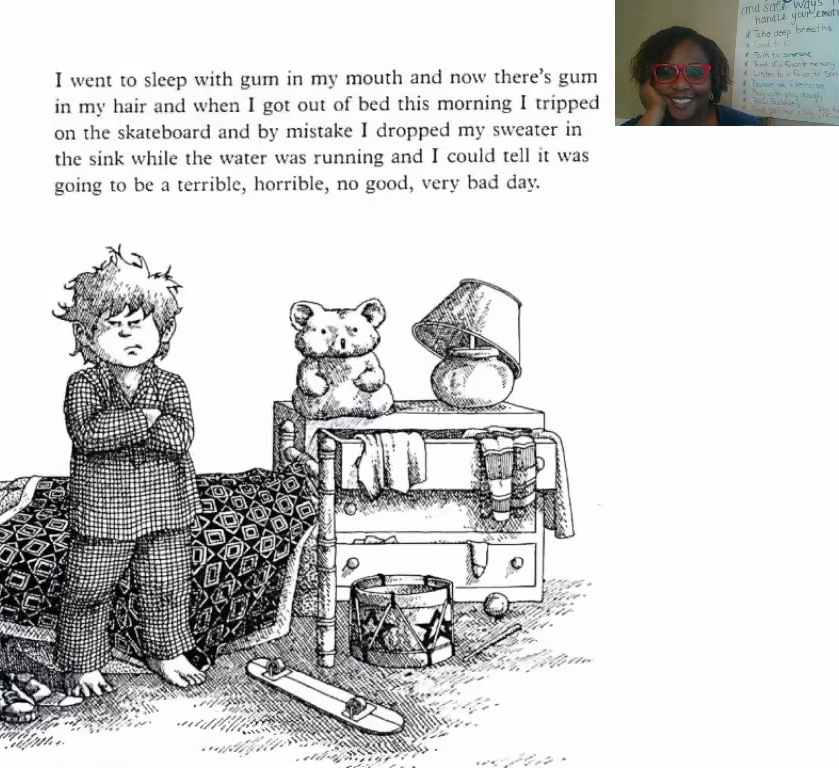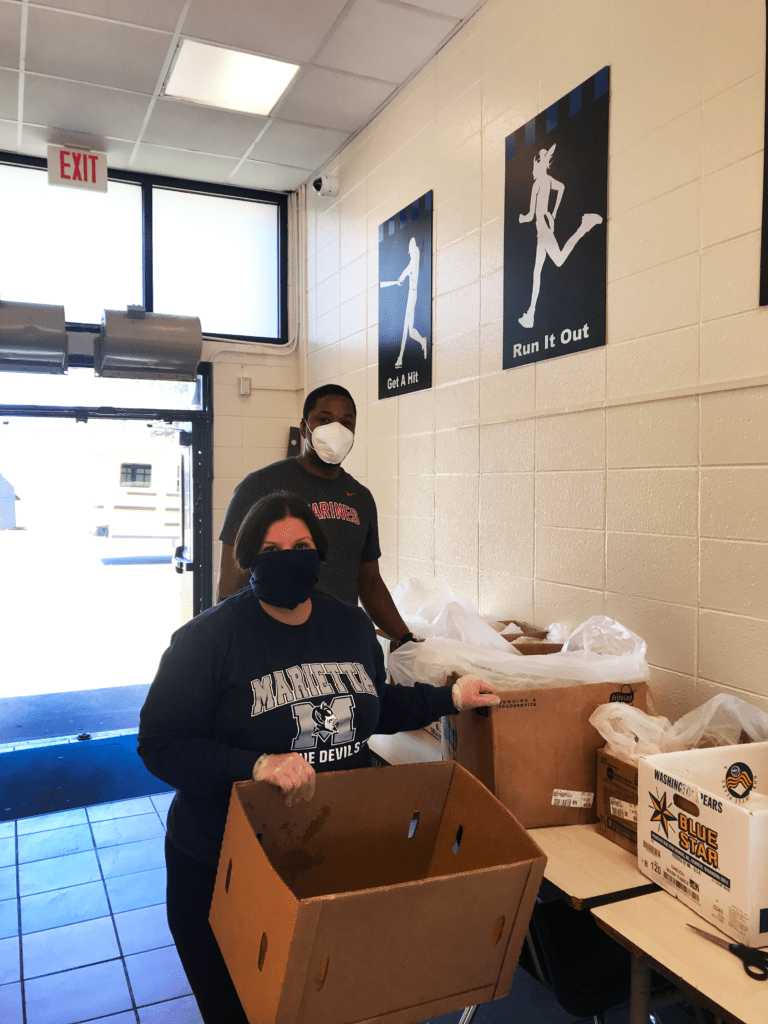For school staff whose mission is to help students navigate their personal and academic lives with robust social-emotional support, the transition to remote learning has been a particular challenge. And, with the COVID-19 pandemic, feelings of stress, anxiety, or sadness may be even more prevalent among students and families.
During this period of uncertainty for many families, the role that school counselors, social workers, and chaplains are playing to address the mental health and well-being of their student population is vital. We spoke to some of these support professionals from across the region about how they are working with students and families to keep everyone well.
Skip to resources
Coping Skills and a Network of Check-Ins with Dr. Tomeka Stringer, a School Counselor at Live Oak Elementary

In a normal week, Dr. Stringer conducts class lessons, small group conversations, and one-on-one counseling for students at her elementary school. Since moving to remote learning, she has adjusted her strategies and focus to aid students with the unique challenges that come with learning from home. Her strategy focuses on communicating coping skills to students and their families and connecting with students through a robust network of check-ins. This includes hosting two prerecorded Zoom lessons each week which, thus far, have focused on skills that are topical to the pandemic. They have covered coping skills, identifying and communicating your feelings, and practicing kindness. Since not all students have access to reliable internet or technology, Dr. Stringer has also been working hard to connect with families over the phone or by email. But, with so many students and only two counselors, all of the school’s staff – teachers, paraprofessionals, and administration – are working together to conduct check-ins by phone so that every family is met with outreach from the school in some way.
In addition to checking in on all of the school’s students and families, Dr. Stringer is checking in with the school’s faculty and staff to ensure that they are also feeling emotionally supported. At their school, they use the Remind app to stay connected as staff and share notes of encouragement with one another.
Her Tips for Helping Your Student Cope at Home:
- Look for resources from the school or county about how to talk to your student about the pandemic – they may have links to videos or other resources on their website. You can also check out the CDC’s guidance here.
- Take breaks.
- If your student is feeling overwhelmed, she suggests taking deep breaths, drawing, going for a walk, or some other hobby to help them relax.
Meeting Families Where They Are with Allison, an Elementary School Counselor
Allison has been working hard to connect with and check-in on her students during remote learning by creating online video lessons and check-in calls with students. For her, it is critical to provide resources and guidance that meet families where they are. That’s why she has refocused some of her lessons, balancing sharing resources without overwhelming her students and choosing to prioritize subjects that address anxiety and emotional well-being. To reach everyone in the school’s population, she is sharing lessons on Youtube that offer translations in the subtitles and resource documents with translations so that families can review material together with their student.
Additionally, to check-in on how students are feeling, Allison regularly sends out a form with emojis so that students can choose an emoji that reflects how they are feeling that day. The form also offers an option for a follow-up call so that Allison can check-in with that student over the phone.
Here’s Her Advice to Families:
- Keep a schedule. However, know that there is no right answer as to what that schedule looks like for each family.
- Be patient with your student and with yourself.
- Remember that remote learning isn’t just in front of a computer. Learning can happen just by spending some time together. Read with your student, learn math by cooking together, go on a nature walk and talk about what you see, teach them how to sort laundry or make their own sandwich. These are all ways to learn!
Supporting Student Goals with Betsy Alpert, the Department Head for the Counseling Department at Marietta High School

Betsy Alpert’s day-to-day before the transition to remote learning was largely focused on dual enrollment coordination, college prep, and new student enrollment at Marietta High School (MHS). With the shift to remote learning and social distancing, the processes for these applications are looking very different. However, Betsy isn’t letting that stop her from helping students reach their goals. For students that are looking to participate in dual enrollment, or who are thinking about college admissions, with many SAT and ACT exam dates cancelled, schools are having to adapt. This means that many colleges, including schools across the University System of Georgia, are transitioning to a “test optional” model for Fall 2020 and 2021 admission – meaning that students don’t need to have one of the entrance exams to complete their application. To help her students navigate the changes in the application systems, Betsy has been working tirelessly calling students to help guide them through the application process and inform them of any changes. She wants to make sure that everyone who wants an opportunity to dual enroll or complete their college application has the chance to do so, in spite of changing circumstances and without making them feel overwhelmed.
Here’s her advice to other professionals:
- Encourage students and families to reach out if they have any questions.
- Check in as much as possible – call students, set up virtual check-ins.
- Work with students to make sure that they aren’t being overwhelmed with work during remote learning. Consider working with the school to implement a modified school schedule by reducing the number of daily hours of work or moving to a four-day week. This can help students have time to apply for college, dual enrollment, or catch up on work.
Combatting Anxiety through Spirituality with Steve Allen, the Senior Chaplain at the Lovett Upper School

A teacher, coach, and senior chaplain at the Lovett School, Steve Allen’s remote learning setup is geared at addressing the spiritual, social, and emotional needs of his students and their families. In a normal school setting, Steve hosts a chapel once every six days. But, with students and their families facing more stressors and anxieties, the school has moved to offering chapel weekly. Each Monday, Steve and his two fellow chaplains share a weekly devotional – a note to the school community with thoughts to keep in mind for the week. However, they have been grappling with how much these weekly devotionals should focus on the current state of the world – do they continue to address the pandemic? Is it important to take breaks from that subject? Steve says they’ve had conversations about this and have settled on somewhat of a balance. Employing spirituality to address something as big and scary as a pandemic can be a helpful tool for some to reduce their anxieties. But Steve recognizes that, sometimes, people need a break from the barrage of talk about the pandemic – that it is the seemingly inescapable topic that we all need a break from.
So, to give students the chance to check-in and talk, whether about the pandemic or otherwise, Steve has made it his mission to be intentional about making himself extra available to students. He has worked to create virtual opportunities for students to check-in with him and one another, like having student life group meetings over Google Hangouts. Steve wants his students to feel supported and have the chance to strengthen and practice their spirituality as a way to get through this uncertain time.
Here’s His Advice to Other Professionals:
- Talk to your graduating seniors about what they are hopeful for so that you can adapt and draft plans to help them feel special during what should be an exciting time for them.
- Brainstorm with students to get a better sense for what resources they want and need to feel supported.
For the social workers and school counselors we spoke to, prioritizing student mental health is paramount. For them identifying risks and keeping children who may be in crisis safe is much more straightforward when they can actually see that student. So, to help manage and address any potential crises, it’s important for this them to ensure that other faculty and staff, as well as families, know what resources are available to their students.
Their Advice on How Other Professionals Can Prioritize & Communicate about Mental Health:
- Share recommended resources with other faculty and staff so that they can connect students and families directly to them, since they may be in closer contact with students.
- Check out nearby community co-ops. They may have resources available to help families in need.
- Communicate the warning signs of a mental health crisis to families so that they know how to identify them and support their student, as needed.

If you or someone you know is struggling, here are some resources that may be of help:
Resources:
- Read the CDC’s Guidance on Stress and Coping during COVID-19.
- If you or your student needs to talk to someone, you can have a Telemental Health Appointment by calling (404) 378-2300. They provide a variety of professional services from tele-therapy to medicine management and crisis intervention.
- Contact the Georgia Crisis and Access Line (GCAL) 24/7 at 1-800-715-4225. They can provide immediate assistance or connect you or your student to additional professional telemental health services.
- Contact a Peer-to-Peer Warm Line. Certified Peer Specialists provide free counseling on everything from anxiety to grief to unemployment.
- If you are in need of financial resources, you can call the United Way of Greater Atlanta’s help line 24/7 by dialing 211. They provide resources ranging from resume building assistance for job seekers to connecting families to resources for dealing with food or financial insecurity.


